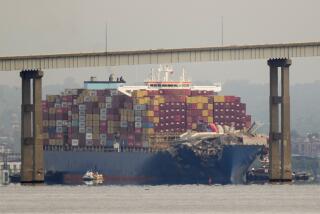Combined Mir-Atlantis Crew Begins Repairing Damaged Space Station
- Share via
MOSCOW — With the star-crossed Mir space station being steadily piloted by the shuttle Atlantis, the 10 astronauts and cosmonauts aboard the linked spacecraft Sunday began a six-day mission focused on repairing damage from a disastrous Russian collision three months ago.
After resting most of the day following their midnight rendezvous in the cosmos, the U.S. and Russian crew members began unloading tons of water, fuel and equipment ferried up to Mir to repair the 11-year-old Russian station.
Among the supplies brought up by Atlantis was a replacement for Mir’s faulty main computer, which has repeatedly caused the space station to lose navigational control and power-generating capacity at a time when Mir is already operating on reduced power because of the June 25 collision with an unmanned cargo craft.
But installation of the computer may have to wait a few days while the crew carries out other repair and inspection work, Yuri Semenov, president of the company that designed and built Mir, told journalists at Mission Control near Moscow.
Semenov also disclosed that the two Russian cosmonauts on Mir during the June collision have been paid only 70% of the salary due from their six-month mission--a hedge in the event an investigative commission decides they should be fined for culpability in the costly crash.
*
Veteran Mir commander Vasily Tsibliyev and flight engineer Alexander Lazutkin have been criticized by some space officials and Russian media for errors in judgment and procedure that contributed to the crash.
Officials from the investigative commission have said the panel has deemed the two crewmen at least partially responsible for the accident and has warned that their pay could be docked as punishment.
But Vladimir Utkin, who is leading the probe, said preliminary findings point to both human error and flaws in the “process.”
Most of the scientific research projects being conducted on Mir by NASA were housed in the Spektr module and were ruined or severely damaged when the crash forced the crewmen to seal off the capsule.
To close the hatch between Spektr and the main Mir cabin, the crewmen had to sever power cables leading to solar batteries arrayed outside the research module. Some power was restored after two spacewalks to replace battery cables and reposition solar panels knocked askew by the crash, but the station continues to suffer from a deficit of power.
Shortly after Atlantis docked with Mir on Saturday, the U.S. shuttle assumed responsibility for maintaining the flight course and solar orientation of the linked spacecraft.
More to Read
Sign up for Essential California
The most important California stories and recommendations in your inbox every morning.
You may occasionally receive promotional content from the Los Angeles Times.











